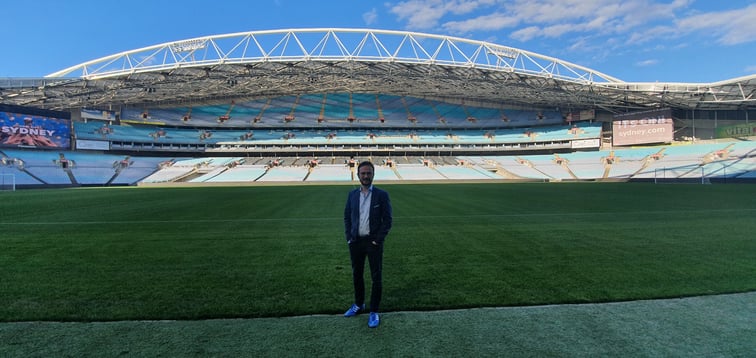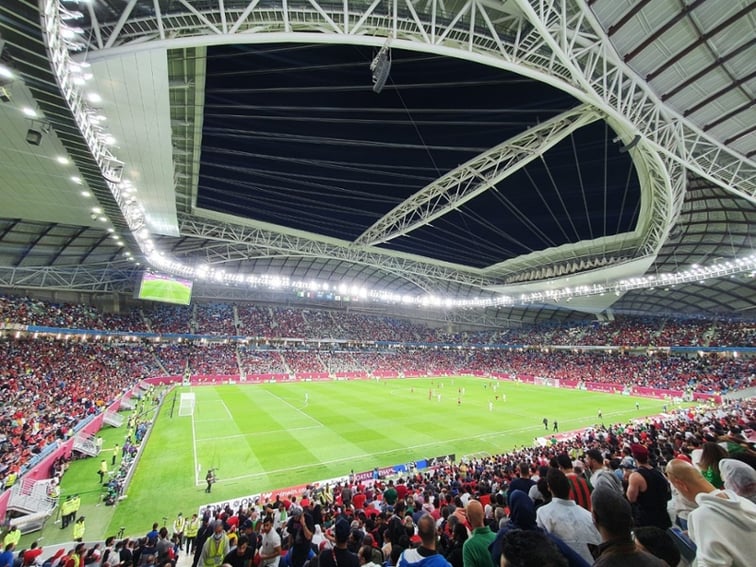Search the latest and greatest job opportunities in sport
 As Ticketing Project Manager at FIFA, Jean-Marie Tardy shares his experience of his sports industry career so far and what his role entails. He also discusses how the role of 'ticketing' in sport is evolving and offers insight and offers advice focused on the key skills and how to overcome potential challenges and be successful in a ticketing career.
As Ticketing Project Manager at FIFA, Jean-Marie Tardy shares his experience of his sports industry career so far and what his role entails. He also discusses how the role of 'ticketing' in sport is evolving and offers insight and offers advice focused on the key skills and how to overcome potential challenges and be successful in a ticketing career.
I have kind of always wanted to work in the sports industry, but I knew that it would be difficult as I had absolutely no network. But this ambition led to the various choices I made during my studies. I graduated from the EM Strasbourg Business School, and I completed my final internship working in Marketing for the Consortium Stade de France. However, after completing this, I was struggling to find a position in the sports industry, so I took a job with an IT start-up. I soon realised that I needed the passion of the sports industry in my professional life, and therefore I resigned.
Without any plan B, I got lucky and joined eForSports, a ticketing services startup with many sports customers in the portfolio (including French Football Federation, PSG and many others). I seized the opportunity to get back into the sports industry and joined the company in the call centre. I was then offered the opportunity to take care of direct marketing campaigns for their customers. By building this experience in Ticketing, I was able to join SecuTix, a ticketing software company who needed a Project Manager to help onboard their customers. The opportunity to work with ticketing professionals in the sports industry in both France and abroad resulted in me developing a deeper understanding of the whole business, and allowed me to extend my network. Furthermore, the involvement in the delivery of major events (including Stade de France concerts, Euro 2016, Ryder Cup 2018, FIFA U20 World Cup Poland 2019) allowed me to develop my expertise and knowledge, and this led to me joining FIFA.
As Ticketing Project Manager, I'm responsible for coordinating the ticketing activities for the tournament I am appointed for. As a reminder, FIFA delivers the FIFA Men and Women's World Cup for Senior, U20 and U17, as well as Futsal and the Beach Soccer World Cup. More recently, with the development of eGaming, our portfolio of tournaments also include the FIFAe Competition, which include the FIFAe World Cup and FIFA eNations Cup.

My main responsibility as ticketing PM is to support the overall delivery of the tournament, taking responsibility for the planning, budget control, implementation and reporting of the ticketing as a whole. Each FIFA functional area appoints a Project Manager for the tournament that becomes the single point of contact for any topics related to his/her area for that tournament. The ticketing project manager also coordinates with the ticketing team (internal and/or external in the case of a Local Organising Committee), and updates the wider FIFA Project Management group. Communication skills and an understanding of the event industry are really key to be able to interact efficiently with all the various areas that make up an event. Depending on the initial organisation of the project, I'm also able to get involved in Venue Operations. For example, I was Ticketing Venue Manager in Al Janoub stadium during the FIFA Arab Cup 2021, making sure any spectators could access the venue and receive assistance if required.
"Communication skills and an understanding of the event industry are really key to be able to interact efficiently with all the various areas working on an event."
I usually stress two points when discussing with individuals seeking a career in the sports industry:
1. Never give up. This seems obvious but entering the sports industry can be tough, and a bit of luck might be needed sometimes. Hence the need for commitment and motivation to achieve your goal - if you stick to it, you will make it happen. This doesn't mean that you shouldn't work and build up your experience in a different sector, but just try and focus on identifying the area of expertise you'd like to develop and bring to the sports industry. Don't be afraid of potentially stepping back as well; if you really want to get into this industry, seize any opportunity to prove your value. There is no such thing as menial jobs when it comes to delivering events.
"Try and focus on identifying the area of expertise you'd like to develop and bring to the sports industry."
2. Look for the bigger picture. Usually, people willing to work in sports only look to join sports organisations. This is normal, but the number of positions in those organisations are limited. All those organisations are actually working with partners, sponsors and providers, that are in the end just as much in the sports industry as the sports organisations themselves. More positions, and sometimes the ability to work in close contact with different sports organisations, could be a perfect way to enter into the sports industry and get to see different problems, as well as meeting lots of different sports professionals. In an industry where “everyone knows each other” it can only be a plus.
I guess the challenges are those you could find in any international organisation - you need to learn and understand cultural differences. When organising tournaments all around the world, with people from different nationalities and backgrounds, you will get caught in cultural differences and different ways of dealing with a situation. Adaptability and an open mind are key personal characteristics, and speaking different languages will also be a clear asset. Of course, especially during events, you have to deal with last minute changes and emergencies that could be stressful, so the ability to keep cool and act under pressure are also crucial.
"Adaptability and an open mind are key personal characteristics, and speaking different languages will also be a clear asset."
Ticketing is probably one of the most evolving fields in the sports industry. Initially seen as a necessary evil, it now gets more attention from organisations. Not only does it bring revenue, but data and knowledge as well, which is almost just as important. While ticketing was usually outsourced to service providers, the last decade has seen a switch and a re-insourcing of ticketing activities by most of the major events organisers, with the aim of taking control back over this strategic activity. From a talent perspective, you have to consider first that very few, if any at all, courses prepare you for ticketing. Ticketing professionals usually have backgrounds in marketing, sales and/or operations.

The ticketing team at FIFA is subdivided into different key areas, where required expertise are different - Project Management, Customer Relationship Management, Finance, as well as the various knowledge around ticketing systems and operations management. I would say that expertise becomes key. Not specifically to ticketing, but having a clear expertise on a dedicated field, that could be transferred to a different context, is what organisations are looking for. However, it goes without saying that an understanding of how the industry works and how events are delivered is also an asset required.
Ticketing is first and foremost about providing access to an event for a wide variety of customers (partners, guests, general public…) through the delivering, securing and controlling of an access device. As an event organizer, controlling ticketing enables quality control of the customer journey at every step, to ensure a smooth and appropriate journey from the decision, to the event, to the access to the venue on match day. With this control, information can be gathered at every step of the journey to get a 360° view of the customers and understand their behaviours and the requirements so we can always improve our offering. So, ticketing is a data generator to feed into ticketing itself, but it's also a data analyst and business intelligence specialist in order to draft a better understanding of our various personas. That is why ticketing is not only about providing a ticket to a customer, but also about making sure people are aware of the event, can access the various products for that event, and come and enter into the venue. Finally, and as mentioned before, ticketing is a revenue generator for an event, as well as a support for plenty of other revenue generating activities, including TV/broadcast, partnership, brand, and promotion.
FIFA is the football governing body. As any governing entity, we have to be at the top of our field and always strive for the best. With multiple tournaments happening every year all around the world, FIFA looks for adaptable, reactive and open minded individuals, with the ability to be a real team player. As mentioned before, having the skills and experience that match the position you're applying for is clearly expected, but this is not necessarily in ticketing per se, as we also need plenty of talent in other areas, such as architecture. Furthermore, speaking English is a must, and any other languages will be considered a plus. Among the benefits you'll receive, you'll also get to work for a governing body, in very nice environments, and travel all around the world to deliver the various tournaments. And more importantly, you'll have the opportunity to be in touch with the fans and the passion of the biggest football events in the world.
Find more great articles to learn about the sports industry on our Learn: Knowledge Hub.png?width=2400&name=CTAs%20(1).png)
Search the latest and greatest job opportunities in sport
One of the many key success factors when assessing the quality of degree programmes is the employability rate of its gra...
Read moreThe global major event industry is one of the most thrilling and impactful career paths you can choose. If you’re lookin...
Read moreStarting his career in New Zealand within sports events, Regan gained valuable experience with Hockey New Zealand and Ne...
Read more